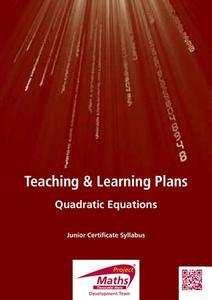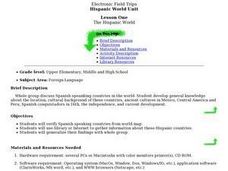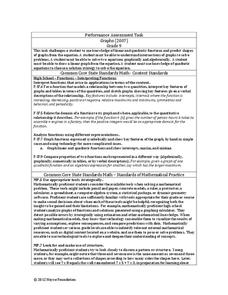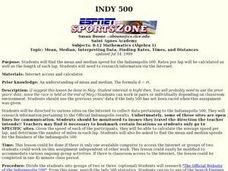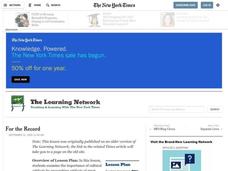Project Maths
Introduction to Quadratics
Develop conceptual knowledge of a quadratic equation and its solutions in your classes. The third algebra lesson in a series of four introduces learners to solving quadratic equations slowly. The first activity explores the zero product...
Curated OER
So You Want to Be a Copy Editor?
Explore what a copy editor does and take a copyediting test. Pupils practice spelling while identifying the skills and knowledge necessary for a career in journalism. The resource is well done.
Curated OER
The Hispanic World
Go on an electronic field trip. Discover Spanish-speaking countries through Internet exploration. Students participate in a whole group discussion to general knowledge about the location, cultural background, independence and current...
Curated OER
The Red Badge Of Courage: Directed Reading Thinking Activity
As part of a Directed Reading Thinking Activity (DRTA) class members are asked to predict events in Patricia Polacco's Pink and Say based on illustrations in the story, on their knowledge of Steven Crane's The Red Badge of Courage,...
Curated OER
Things Fall Apart: Bloom's Taxonomy of Thinking Processes
One of the things that makes Bloom's Taxonomy so effective is that it works off different levels of understanding. Test your readers' knowledge, comprehension, application, analysis, synthesis, and evaluation with these short questions....
Visa
Buying a Home
What is the difference between buying and renting a home? Learners become more informed consumers and financially literate adults after developing foundational knowledge of the home-buying process.
Visa
Home Sweet Home: Purchasing a Place
While the process of buying a home can certainly be overwhelming, give your young adults a leg up for their future by introducing them to the components of a mortgage, as well as exploring the basic concept of credit and how to become...
EduGAINs
Go Eco! Ecosystems
How is a movie theater like a desert biome? Compare systems to ecosystems with a set of activities that focuses on accessing multiple intelligences and building upon knowledge. As learners discuss the ways elements of an ecosystem depend...
Curated OER
The 16 Habits of Mind
Study the 16 Habits of Mind with a professional resource. Based on Describing 16 Habits of Mind by Arthur L. Costa and Bena Kallick, the resource details 16 ways learners perceive problems around them and produce ways to deal...
Inside Mathematics
Graphs (2007)
Challenge the class to utilize their knowledge of linear and quadratic functions to determine the intersection of the parent quadratic graph and linear proportional graphs. Using the pattern for the solutions, individuals develop a...
Royal Society of Chemistry
Hazard Symbols
Starting in 2015, all chemicals must have a pictogram of the associated chemical hazards. A brain-building activity reviews four of the basic symbols found in a typical science laboratory. Through a fun puzzle, scholars apply their...
Royal Society of Chemistry
Born-Haber Cycle: NaCl
Max Born and Fritz Haber developed the Born-Haber cycle in 1916, which is used for measuring enthalpy that otherwise couldn't be measured. Young scientists solve four matching puzzles using their knowledge of the stages, standard...
Curated OER
How the New Year is Celebrated around the World
Develop compare and contrast skills while expanding cultural knowledge by looking at how different countries ring in the new year.
Curated OER
Delivery Trucks
Written to assess students' knowledge of interpreting expressions that represent a quantity in terms of its context, this machine-scored task also allows for a good discussion about units guiding the problem solving and solution.
Curated OER
Take Effective Class Notes: Strategic Note-Taking
Your class members will feel confident in taking notes during your next lecture with this great note-taking worksheet, through which learners practice activating prior knowledge, recording key points, flagging...
PHET
Pre- and post-assessment (High School)
Need to gauge your pupils' understanding before the activity begins? A base assessment includes short answer and drawings to determine pupil knowledge. Advanced assessment covers vector addition.
EngageNY
TASC Transition Curriculum: Workshop 8
Lights, camera, action! Math educators consider how to improve their instruction by examining a model of the five-practice problem-solving model involving a movie theater. Participants examine cognitive demand in relation to problem...
Curated OER
Biotechnology Laboratory Research
Students participate in an extended laboratory research to experience how scientific information is obtained, upon which we build scientific knowledge and understanding.
Curated OER
Creative Writing Workshop (Middle, Reading/Writing)
Bring this lesson into your unit about creative writing and precise language. First, middle schoolers create a piece of writing with the help of their classmates. In the second part of this workshop, they edit their own piece of writing....
Curated OER
Indy 500
Start your engines! Small groups collect data from websites pertaining to the Indianapolis 500 in order to determine average speed per lap and miles in each lap. The instructional activity requires prior knowledge of the the formula d=rt.
Curated OER
For the Record
Students read a New York Times article in order to examine the importance of cultural artifacts. They create essays from the point of view of one cultural artifact to demonstrate the knowledge they gained by doing research.
Curated OER
Crime Scene Investigation - Biology Teaching Thesis
Students explore the different blood types, and are introduced to new knowledge through a crime scene simulated activity. They explore the genetics of blood types, and are introduced to immunology/diseases.
Curated OER
The Wright Brothers on Hollywood Squares
Students test their knowledge of the Wright brothers by playing "Hollywood Squares." They read (or listen) with comprehension. Students follow the rules as they actively participate in a game to test their reading (or listening)...
Curated OER
Folds in the Earth
Ninth graders demonstrate the forces that cause folds in the earths crust by use of clay modeling. They demonstrate there knowledge of terminology and concepts related to Earths folding processes by a written or oral report on data...
Other popular searches
- Core Knowledge
- General Knowledge
- Core Knowledge Foundation
- Activating Prior Knowledge
- Core Knowledge Reading Program
- Prior Knowledge
- Depth of Knowledge
- Core Knowledge Lesson Plans
- General Knowledge Quiz
- Background Knowledge
- Core Knowledge Lessonplans
- Knowledge of Literary Symbol
